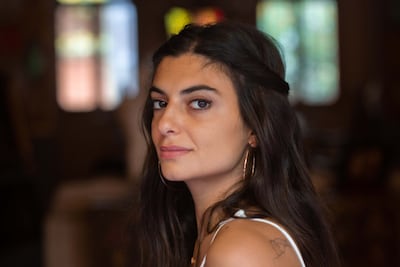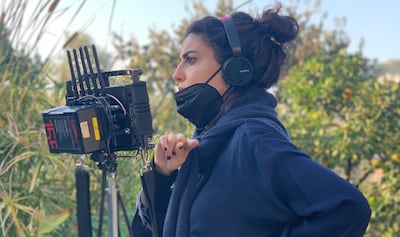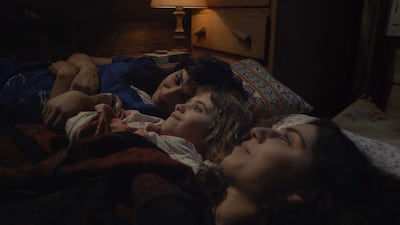When Lebanese writer-director Mounia Akl heard that her debut feature film Costa Brava, Lebanon, had been accepted for the Venice and Toronto film festivals, she found it difficult to celebrate. With Lebanon currently enduring a horrifying financial crisis, life is anything but easy. But at least these festival berths will help to draw attention to her homeland. “Beyond being exciting for the film or for my career, it feels like an opportunity to talk about Lebanon to the world,” she says. “It feels like a response.”
Akl is in Barcelona when we speak, staying in the apartment of her co-writer, Clara Roquet. They met at Columbia University in New York, where Akl studied film. “I read her scripts and I fell in love with them. And I realised that her and I had a lot in common – the type of stories we wanted to tell and how we both cared about family dynamics and how they mirrored the structure of a society and how family really builds, in many ways, who you become.”

Five years ago, Akl and Roquet collaborated on short film Submarine, a near-future story about Lebanon's waste crisis. Many of the characters wore masks in what now feels like an eerie prefiguring of the world around us. “Today, when you watch Submarine, it doesn’t look like a dystopian film anymore because that has become reminiscent of the pandemic imagery of 2020 and 2021,” says Akl, who took up the subject of the environment in Costa Brava, Lebanon, too.
“What happened with Costa Brava is that reality caught up with me,” she explains. “Lebanon today is much more tragic, dystopian, overwhelming and inhumane than the sci-fi film I imagined in 2030. So Costa Brava is now set in Lebanon 2020 because it’s no longer a dystopian film. It’s a film about today’s reality. And that was a crazy thing to accept and admit.”
In Submarine and Costa Brava, Lebanon, Akl was “questioning our relationship to home and our relationship to this fight-or-flight debate”, exploring the idea of abandoning your homeland. In the case of the latter, the story follows the free-spirited Badri family, led by Soraya (Nadine Labaki) and Walid (Saleh Bakri) who have escaped the toxic pollution of Beirut to set up a new home in the mountains.

The twist comes as the government resolves to put a landfill site right next to their rural retreat, causing their own relationships to fissure. “This family who try to create a self-sustainable bubble away from the city that broke their hearts and crushed their dreams … reality catches up with them,” says Akl. “You can’t find a moment of peace or oxygen and they find themselves faced with having to resist an invasion that they never wanted.”
In real life, "Costa Brava" is the name given to the landfill site next to Beirut-Rafik Hariri International Airport. “They named [it] Costa Brava because many years ago it was this beautiful coast with a beautiful beach. So they just copied the Spanish and called it Costa Brava. And it now has become garbage landfill, which is ironic.” A coastal beauty spot despoiled by landfill – that does indeed sum up mankind’s mountainous environmental issues.

That Akl even managed to complete Costa Brava, Lebanon, is nothing short of miraculous. Mounting a production during Lebanon’s economic crisis was nightmarish. “Money in Lebanese banks, which we had received from foreign funds, had lost some of its value,” she says. “We were dealing with a general state of depression in the country. We were dealing with inflation. We were dealing with a pandemic. Already making a film is a miracle in itself. Making a film in Lebanon in 2020 really felt like we were swimming against the current.”
On August 3, 2020, there was something to celebrate: the production was finally greenlit. But the very next day, tragedy struck when an explosion rocked Beirut, devastating the city and killing at least 190 people. “In a split second, our lives changed. Suddenly I was going from doing a creative meeting with the team at the office to looking for team members in the rubble. And it was a big, big shock for all of us. My producer ... his whole home was destroyed. The office was destroyed. Our homes were destroyed.”
The production was halted for two months. Some crew members endured such bad trauma from the explosion, they couldn’t return. Others felt they desperately needed the film to keep going. “I think what this film provided was a moment of community where we really needed each other. So it became more than just making a film, it became really an act of resistance. Like, ‘I don’t want to feel like they’ve taken it all from us. I don’t want to agonise and stop telling stories.’”
Among the supporters Akl had for the project was her leading lady, Labaki, the filmmaker behind Caramel and the Oscar-nominated Capernaum. “I respect her cinema and I respect her as an actress a lot,” says Akl, whose childhood bedroom just so happened to be above the music studio owned by Labaki’s husband, composer and songwriter Khaled Mouzanar. “I felt she really trusted me. The director Nadine was not there on the shoot. She was a very empathetic, generous actress who also had great ideas.”
Akl has acted herself, including on the popular television show Beirut, I Love You, which she co-created, although she says she has no interest acting in a movie of hers. “I just really love being behind the camera and to have this relationship with my actors where I’m looking at them and experiencing that without being with them.” Would she consider acting for Labaki? “If Nadine offered me a role that I thought I can give to and that would help the character, of course I would say yes.”
After putting the finishing touches to Costa Brava, Lebanon, and guiding it through the festival season, Akl will return to work with her writing partner Roquet. “We found this perfect way to work with each other where I collaborate with her on the scripts she directs. And she collaborates with me on the scripts I direct,” says Akl. They’re currently developing a TV show, too – and the bond between the two is clearly tightknit. “It’s very special,” she says. Long may it continue.
Costa Brava, Lebanon, has its world premiere at the Venice International Film Festival on Sunday, September 5

